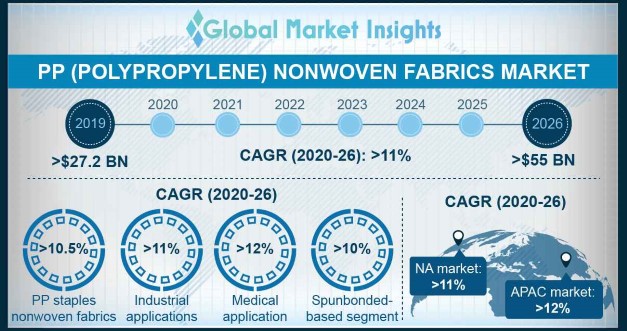PP (Polypropylene) Nonwoven Fabrics Market to witness substantial gains from hygiene & medical applications over 2016-2024
Publisher : Fractovia | Published Date : 2017-04-14Request Sample
Rising incidence of incontinence related ailments among the rapidly increasing aging population will spur PP (polypropylene) nonwoven fabrics market demand. Incontinence care based items, which amassed a revenue of USD 6 billion in 2014, is likely to hit USD 11 billion by 2024. Widespread demand for baby diapers across Asia Pacific will further benefit the industry. Growing demand for PP (Polypropylene) nonwoven fabrics across automotive and agriculture sectors is likely to enlarge the business space. As per Global Market Insights, Inc., “PP (Polypropylene) nonwoven fabrics industry revenue, worth USD 18 billion in 2015, is expected to surpass USD 40 billion by 2024.”
Europe PP Nonwoven Fabrics Market size, by Product, 2015 & 2024 (USD Million)

Taking into consideration the regional trends, U.S. PP (Polypropylene) nonwoven fabrics industry is likely to hit USD 7.5 billion by 2024. Its mounting popularity across geotextile, automobile, and construction sectors will contribute significantly towards the regional revenue. Hygiene applications in the U.S. produced a revenue of more than USD 1.25 billion in 2015.
Japan and China are likely to drive the growth of PP (Polypropylene) nonwoven fabrics market in Asia Pacific. Japan PP nonwoven fabrics industry is forecast to record a CAGR of 8% over 2016-2024, owing to high demand for incontinence care based items. China industry is projected to cross a revenue margin of USD 6 billion by 2024, with many of the reputed firms planning to expand their baby diaper manufacturing business in the country.
Germany PP (Polypropylene) nonwoven fabrics industry is predicted to witness a prominent growth in the years ahead. Industry players in Europe are making technological upgradations to meet the regulatory compliances.
Based on the product trends, PP (Polypropylene) nonwoven fabrics market is segmented into composite, spunbonded, meltdown, and staples based products. Spunbonded based PP (Polypropylene) nonwoven fabrics industry is projected to grow at a rate of 8.5% over the period of 2016-2024. Their wide applications in carpet backing, protective apparel, medical sector, disposable items, and furniture sectors will boost the growth.
Staples based PP nonwoven fabrics market is forecast to record a CAGR of 7% over the coming timeline, driven by its prominent use in construction activities, vehicles, and geotextiles. Meltdown based PP (Polypropylene) nonwoven fabrics industry is slated to reach a targeted revenue margin of USD 8 billion by 2024, owing to its high demand across hygiene sector.
PP nonwoven fabrics also find extensive applications across hygiene, furniture, medical, carpet, and geotextiles sectors. Furniture application is expected to register substantial gains at 9% CAGR over the coming seven years, driven by its escalated use in production of furniture & bedding construction sheets, dust covers, spring wraps, arms & back, blankets, and insulators.
PP (Polypropylene) nonwoven fabrics market size in the hygiene sector is expected to reach USD 18 billion by 2024, owing to its extensive use in production of baby diapers, female disposables, incontinence items, and wipes.
PP (Polypropylene) nonwoven fabrics industry size in the medical sector is anticipated to grow notably, subject to high healthcare expenditure in Europe, China, and the U.S. They are prominently used in production of ostomy liners, surgical caps, masks, gloves, heat packs, incubator mattress, and drapes.
Global PP (Polypropylene) nonwoven fabrics market share is distributed among the top four market players accounting for more than 40% of the overall volume. Industry participants will try to gain competitive edge through strategic collaborations and joint ventures. First Quality Nonwovens Incorporation, Kimberly-Clark Corporation, Companhia Providência Company, Mitsui & Company Limited, SABIC, Avgol Nonwoven Industries, A.R. Fibtex Private Limited, Toray Industries, Fiberweb (India)Limited, ExxonMobil Corporation, Fitesa S.A., Polymer Group Incorporation, and Pegas Nonwovens are the key participants of PP (Polypropylene) nonwoven fabrics industry.